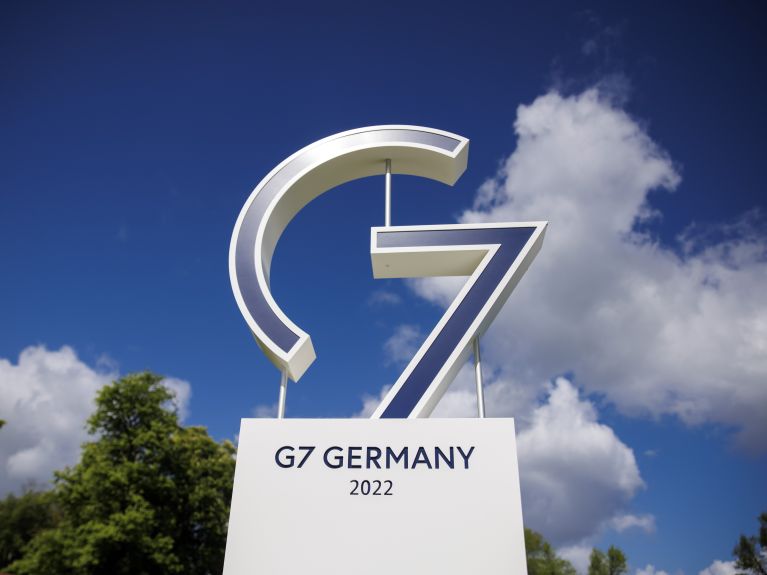Which countries make up the G7?
The Group of 7 is made up of the largest democratic economic powers – find the most important facts and figures here.

Which countries make up the Group of Seven?
The Group of Seven (G7) is not an international organization, but an informal association of the seven democratic industrialized countries of Canada, France, Germany, Italy, Japan, the United Kingdom and the United States of America – plus the European Union as a permanent guest. The members represent about 10 percent of the world's population and 45 percent of global gross national income. At their annual summit meetings, the heads of state and government of these countries coordinate their positions on global political issues – above all on questions relating to the world economy, foreign and security policy, development and climate policy. Here we introduce the members (in alphabetical order):

Germany
In 2022, Germany holds the rotating G7 Presidency and will host the G7 summit at Schloss Elmau in Bavaria at the end of June.
Form of government: parliamentary republic
Head of government: Olaf Scholz
Capital: Berlin
Population: 83,129,285
Area: 357,588 km2
Population density (per km2): 232
Gross domestic product (2020): US$ 4.5 trillion
National holiday: 3 October, Day of German Unity
France
France and Germany – then in the persons of President Valéry Giscard d'Estaing and Chancellor Helmut Schmidt – formed the Group of Six in 1975 in response to the collapse of the Bretton Woods exchange-rate system and the first major oil crisis.
Form of government: semi-presidential republic
President: Emmanuel Macron
Capital: Paris
Population: 67,422,000
Area (km2): 632,734
Gross domestic product (2020): US$ 3.0 trillion
National holiday: 14 July, Storming of the Bastille
German Embassy: https://allemagneenfrance.diplo.de/fr-fr
United Kingdom
The United Kingdom is one of the co-founders of the G7. Even after its withdrawal from the EU, it is linked to Germany by its membership of NATO, the G20, the United Nations and other international bodies.
Form of government: parliamentary monarchy
Prime Minister: Rishi Sunak
Capital: London
Population: 66,800,000
Area (km2): 248,528
Gross domestic product (2020): US$ 3.0 trillion
National holiday: none
German Embassy: https://uk.diplo.de/uk-en/01/embassy/
Italy
Germany and Italy are considered 'young nations.' In both the G7 and the EU, they were countries of the first hour. Chancellor Olaf Scholz and Prime Minister Mario Draghi want to intensify their cooperation even further.
Form of government: parliamentary democracy
Prime Minister: Giorgia Meloni
Capital: Rome
Population (2020): 60,026,546
Area (km2): 301,338
Gross domestic product (2020): US$ 2.5 trillion
National holidays: 25 April, Liberation Day; 2 June, Republic Day
German Embassy: https://italien.diplo.de/it-de/vertretungen/botschaft
Japan
Japan is the only Asian country among the participants. Germany and Japan are linked by over 160 years of diplomatic relations and a great deal of common ground in political, economic and social matters.
Form of government: parliamentary monarchy
Head of government: Fumio Kishida
Capital: Tokyo
Population: 125,078,382
Area (km2): 377,975
Gross domestic product (2020): US$ 5.3 trillion
National holiday: 23 February, Emperor's birthday
German Embassy: https://japan.diplo.de/
Canada
Canada is the youngest member of the G7. The country was admitted to the Group at the 1976 summit in Puerto Rico. German-Canadian relations are based on shared values and active cooperation in international bodies.
Form of government: federal parliamentary monarchy
Prime Minister: Justin Trudeau
Capital: Ottawa
Population (2021): 37,100,000
Area (km2): 9,984,670
Gross domestic product (2020): US$ 2.0 trillion
National holiday: Victoria Day, last Monday before 25 May,
German Embassy: https://canada.diplo.de/ca-en/vertretungen/embassy
United States of America
With President Joe Biden, the world's largest economic power is again placing greater emphasis on international cooperation. For Germany, the transatlantic partnership is the most important pillar of foreign policy alongside European integration.
Form of government: federal presidential republic
President: Joe Biden
Capital: Washington, D.C.
Population (2020): 331,449,281
Area (km2): 9,525,067
Gross domestic product (2020): US$ 23 trillion
National holiday: 4 July, Independence Day
German Embassy: https://www.germany.info/us-en
European Union
As a supranational organization, the European Union has been the eighth member, so to speak, of the G7 since 1981 and has participated at a high level in the meetings ever since.
President of the European Commission: Ursula von der Leyen
President of the European Council: Charles Michel
Population: 447,100,000
Area (km2): 4,234,564
Gross domestic product (2020): US$ 102 trillion